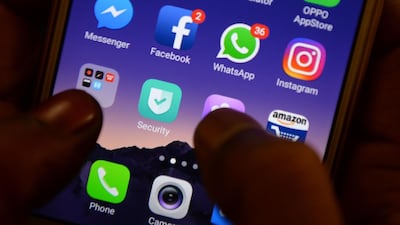When The National launched 11 years ago, one of our earliest references to mental health was in a report about an audit of young people's wellbeing in Abu Dhabi that had been organised by the health and education ministries.
Mental health and obesity were identified as two areas of concern and a senior health official was quoted as saying that students can experience many problems such as anxiety and depression. The official went on to recognise that the teenage years in particular are complex times for young people, a period of “fast change” when small problems can quickly escalate into bigger issues.
Today's teenagers will probably tell those who were teens a decade ago that they had it easy. Smartphones and social media had barely taken hold back then and we weren't always switched on, as we are today. In 2019 the average UAE resident spends six hours per day glued to their smartphones while in the UK, where I come from, that number is comparatively lower but still worrying: between three to four hours every day. Much as we try to convince ourselves that screen time comes without consequences to our wellbeing, it has become an increasingly hard argument to make in a convincing way.
In the years since 2008, we have also heard far more discussion of mental health and the pressures that all of us sometimes feel. This newspaper has played an active role in leading that conversation. There is, of course, much work still to be done in the field of mental health reporting, even if it is now easy to see how far we have travelled up that road. In general society, there is still stigma and there are still taboos, but they are being dismantled.
Over the past year, a couple of my previous columns have dealt with different aspects of this subject of mental health: the first, written to mark the anniversary of the death of the teenager Louis Smith, who took his own life in 2013, and the second, about my late mother's dementia diagnosis and why I am opposed to a predictive Alzheimer's test. It is gratifying to note that both pieces gathered plenty of reaction, mostly positive, which suggests to me there is a willingness to engage with these kind of issues.
This newspaper has also recently begun working with the Carter Centre, a US-based not-for-profit, non-governmental organisation whose objectives include improving our understanding of behavioural health. The National runs the UAE arm of the Rosalynn Carter Fellowship for Mental Health Journalism programme as well. The idea of the programme is to help increase the quality and accuracy of mental health reporting around the world and, in the case of the UAE programme, to improve how these issues are reported locally.
One of our reporters, Nick Webster, is a Carter Centre fellow, and his work over the past year has helped sketch out an informal map of the mental health landscape in this country.
In May, he wrote about a scheme in Sharjah that helped taxi drivers recognise signs of depression and gave them advice on where they could seek help. In July, he told the story of a Dubai model who had faced an incessant barrage of cyberbullying. He has previously reported on the pressures social media places upon young people. Last year, he found that insurance coverage can be patchy when it comes to mental health.
It’s a fool’s game to suggest there is some kind of narrative binding those stories together, but they do at least speak to a society where there is more recognition of depression than ever before, one where insurance companies need to be encouraged to extend their coverage to help tackle such disorders and that the scale of the problems that social media produces are huge and underreported.
So how do we improve the landscape in the UAE? The answer to that question lies in action and words. From the paper's perspective we will continue to report on anxiety, depression and the pressures that manifest themselves in modern life in an informed and unsensationalised way. On a medical insurance level, it is my sincere hope that more access is afforded to treat these and other conditions. On a societal level, we all need to keep having those difficult conversations. More broadly, if a national helpline was established, and there have been various initiatives to do so, this might provide the neutral and non-judgmental space for any of us to seek counsel in times of trouble.
What that wish list also tells us is that just as the term “mental health” is an inelegant, one-size-fits-all label to describe many different conditions, there is also no single response to make things better.
Nick March is an assistant editor-in-chief at The National


